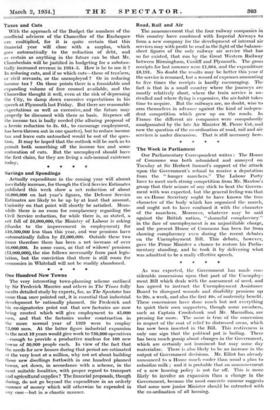Taxes and Cuts With the approach of the Budget the
numbers of the unofficial advisers of the Chancellor of the Exchequer are, multiplied, for it is quite certain that this financial year will close with a surplus, which goes automatically to the reduction of debt, and as certain as anything in the future can be that Mr. Chamberlain will be justified in budgeting for a substan- tially increased revenue in 1934-5. How is he to use it ? In reducing cuts, and if so which cuts—those of teachers, or civil servants, or the unemployed ? Or in reducing income tax ? On those points there is a formidable and expanding volume of free counsel available, and the Chancellor thought it well, even at the risk of depressing the City, to damp down excessive expectations in his speech at Plymouth last Friday. But there are reasonable expectations as well as excessive, and the future may properly be discussed with them as basis. Sixpence off the income tax is badly needed (the alluring proposal of a heroic reduction to. 2s. 6d., to encourage employment, has been thrown out in one quarter), but to reduce income tax and leave cuts untouched would be out of the ques- tion. It may be hoped that the outlook will be such as to permit both something off the income tax and some restoration of cuts. But the unemployed should have the first claim, for they are living a sub-normal existence today.




























































 Previous page
Previous page